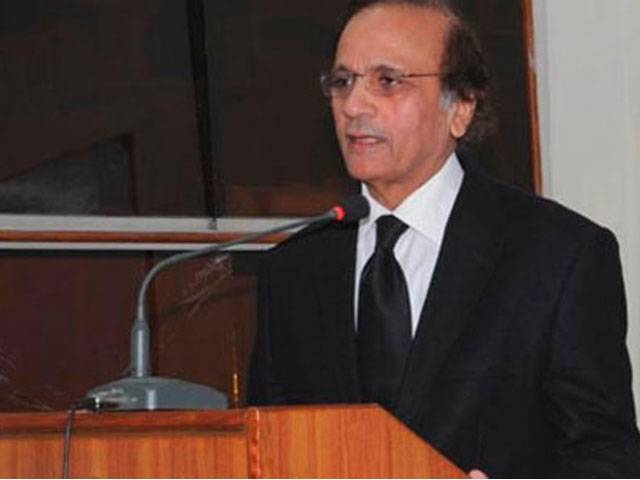ISLAMABAD - Chief Justice of Pakistan Tassaduq Hussain Jillani on Tuesday remarked that according to the Pakistan Penal Code (PPC) Article 295, offence against any religion comes under the blasphemy law. The CJ also expressed annoyance over non-registration of cases against the culprits involved in temple infernos in Sindh.
Hearing suo motu case of the Peshawar church blasts, Chief Justice Jillani also observed the Constitution of Pakistan and the Objective Resolution provide full protection to the fundamental rights of minorities.
“Providing protection to the minorities and their worship places is the constitutional responsibility, so the apex court would fulfil it,” the chief justice said, while heading a three-member bench.
The bench, also comprising Justice Azmat Saeed Sheikh and Justice Mushir Alam, heard the suo motu case of the Peshawar church blasts and miscellaneous applications, seeking protection to minorities’ worship places.
Chief Justice Jillani said the desecration of the minorities’ worship places was a serious crime under Section 295 of the PPC. The chief justice pointed out that articles 20 and 22 protected the rights of minorities and observed the relevant authorities did not ensure the protection of their rights guaranteed by the Constitution.
The chief justice said that in the light of these articles, the court would set guidelines for the law-enforcing agencies so that they could ensure protection of worship places of the minorities.
The chief justice, appointing former attorney general Munir A Malik, Khawaja Haris and Hassan Aurangzaib as amicus curea (friends of court) to assist in chalking out guidelines for the protection of minorities’ worship places, said they would examine whether to direct the law-enforcement agencies to ensure full protection to the temples and churches or establish a separate force for the purpose.
The court directed the Sindh inspector general of police (IGP) to submit a complete report on the recent waves of attacks on temples in the province within a week, besides ordering the Punjab advocate general to submit a report in the first week of June on non-registration of marriages of the minority community.
The chief justice, however, asked the parties concerned, including representatives of the minorities, to provide the court written suggestions for the protection of their worship places so that the court could address these issues.
During the proceedings, Ramesh Kumar, representative of Hindu community, informed the court of the recent attacks in which several Sindh temples were set on fire.
He said that in March, 2014, six incidents of the desecration of Hindu temples took place in Shikarpur, Larkana, Tharparkar, Khairpur, Mithi, Hyderabad and the most recent on May 7 in Lee Market, Karachi. Kumar alleged the authorities did not take action against the miscreants and no case was registered against them.
The Sindh additional advocate general, Sindh, however, rejected the allegations, saying the cases in all the incidents had been registered. The court asked him whether the cases had been registered under the PPC section concerning desecration of worship places. The Sindh AAG replied that there was no section in the PPC regarding the sacrilege of worship places. The court asked him to read Section 295 of PPC in which it had been clearly written that desecration of worship places was a crime. The court then directed the Sindh inspector general of police to submit a complete report on the attacks on Hindu temples within a week.
Michael Javed, representative of Christian community, told the court that YMCA, an institute in Karachi, was in bad condition and, presently, being run by an unauthorised authority. He said the matter had been pending with the Sindh High Court since 2005 and that the SHC had appointed the court naazir to look after the institution.
Sindh Additional Advocate General Mir Qasim Jath assured the court of submitting a report before the court within a week.
Dr Ramesh Kumar said that according to Liaqat-Nehru pact the chairman of the evacuee property trust should be a Hindu. On this, the chief justice remarked that the political situation among the two nations was not good so that the accord was not implemented on both sides but the apex court is trying to facilitate them on humanitarian grounds.
A representative of Churches of Pakistan informed the court that the issue of non-registration of marriages of minorities still persisted, on which the court issued a notice to the Punjab advocate general, with the direction to submit reply by the first week of June and adjourned the hearing.
At the beginning of the hearing, Chief Justice Tassaduq Jillani said that the court would share the grievances of the minorities.
The court also directed Advocate General Khyber Pakhtunkhwa to submit a detailed report regarding a Hindu samadhi in Karak district.
During the hearing, the chief justice also hailed the role of Indian Supreme Court for the welfare of minorities in India.
Friday, April 19, 2024
Offence of any religion comes under blasphemy law: CJP
| Says court can order separate force for minorities’ protection | Seeks reports about attacks on Sindh temples, non-registration of minorities’ marriages in Punjab

Caption: Offence of any religion comes under blasphemy law: CJP
Opposition objects to oath-taking of MNAs amid lawlessness
5:15 PM | April 19, 2024
Electioneering to end on Friday night ahead of by-polls in 21 constituencies
5:14 PM | April 19, 2024
Fawad Chaudhry granted bail in 14 cases related to May 9 violence
5:13 PM | April 19, 2024
British Army chief lauds Pakistan Army's professionalism, expertise
5:12 PM | April 19, 2024
Israeli aircraft fire missiles at Air Force assets in Iran: Report
3:52 PM | April 19, 2024
A Tense Neighbourhood
April 19, 2024
Dubai Underwater
April 19, 2024
X Debate Continues
April 19, 2024
Hepatitis Challenge
April 18, 2024
IMF Predictions
April 18, 2024
Kite tragedy
April 19, 2024
Discipline dilemma
April 19, 2024
Urgent plea
April 19, 2024
Justice denied
April 18, 2024
AI dilemmas unveiled
April 18, 2024
ePaper - Nawaiwaqt
Advertisement
Nawaiwaqt Group | Copyright © 2024





